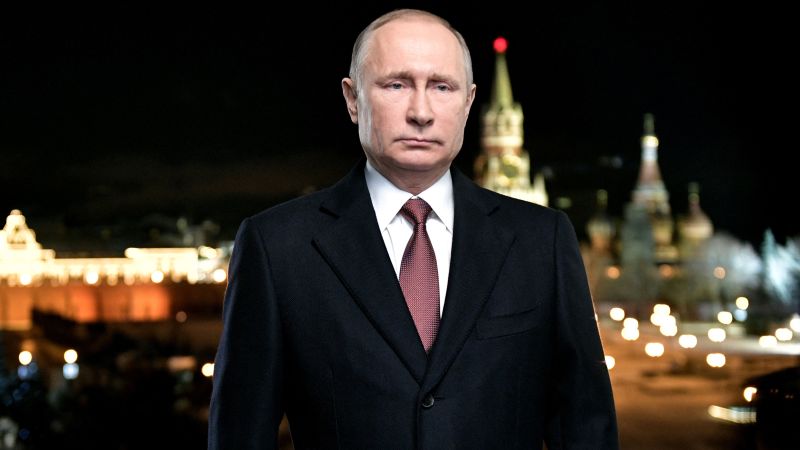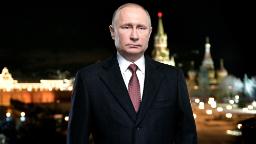

A version of this story first appeared in CNN’s What Matters newsletter in 2022. To get it in your inbox, sign up for free here.
CNN
—
After more than a year of international outrage at Russia’s invasion of Ukraine and shocking atrocities, there’s an arrest warrant out for Russian President Vladimir Putin.
The International Criminal Court on Friday announced charges against Putin and Russian official Maria Lvova-Belova relating to an alleged scheme to forcibly deport thousands of Ukrainian children to Russia.
Read CNN’s full report about the charges and the arrest warrant.
And read about the scheme involving Ukrainian children taken to Russia.
Russia rejected the allegations Friday, and a ministry of foreign affairs spokeswoman said the court has “no meaning” in Russia.
There have long been calls for the court to bring charges against Putin. It has been investigating allegations of war crimes in Ukraine since Russia first invaded part of the country in 2014. Those calls intensified with the all-out invasion last year.
Karim Khan, the ICC’s chief prosecutor, has talked about his efforts and the need to methodically build cases with proof. That said, the likelihood that Russia’s president will ever actually physically see the inside of a courtroom as long as he remains in power in Russia seems beyond slim.
Here’s a very broad look at war crimes and the international justice movement.
Note: Some of what’s below comes from CNN’s research library, which compiled information about the International Criminal Court.
The International Criminal Court has specific definitions for genocide, war crimes, crimes against humanity and the crime of aggression. Read about them in this guide published by the ICC.
Specifically, targeting civilian populations, violating the Geneva Conventions, targeting specific groups of people and more could be potential Russian war crimes.
Khan said there can be justified attacks in civilian areas if they are being used to launch attacks. But even then, he said, attacks in civilian areas cannot be disproportionate.
There is a method of gathering evidence from testimony, satellite images and elsewhere to meet a burden of proof.
Located in The Hague, Netherlands, and created by a treaty called the Rome Statute first brought before the United Nations, the International Criminal Court operates independently.
Most countries on Earth – 123 of them – are parties to the treaty, but there are very large and notable exceptions, including Russia and the US. And, for that matter, Ukraine.
Anyone accused of a crime in the jurisdiction of the court, which includes countries that are members of the ICC, can be tried. The court tries people, not countries, and focuses on those who hold the most responsibility: leaders and officials. While Ukraine is not a member of the court, it has previously accepted its jurisdiction.
Putin is therefore eligible for being indicted by the court for ordering war crimes in Ukraine.
However, the ICC does not conduct trials in absentia, so he would either have to be handed over by Russia or arrested outside of Russia. That seems unlikely as long as Putin is in power.
The ICC is meant to be a court of “last resort” and is not meant to replace a country’s justice system. The court, which has 18 judges serving nine-year terms, tries four types of crimes: genocide, crimes against humanity, crimes of aggression and war crimes.
Court proceedings can be brought in one of two ways: Either a national government or the UN Security Council can refer cases for investigation.
Russia, a permanent member of the UN Security Council, has veto power over council actions. It was requests by 39 national governments, most of them European, that sparked the current investigation.
Khan previously told CNN, “I want to emphasize that I’m willing to speak to all sides, and not just the Ukrainian side, but also the Russian Federation, state parties and non-state parties alike. This institution is not political. We’re not part of the geostrategic or geopolitical divisions that we witness around the world.”
If justice in general moves slowly, international justice barely moves at all. Investigations at the ICC take many years. Only a handful of convictions have ever been won.
A preliminary investigation into the hostilities in eastern Ukraine lasted more than six years – from April 2014 until December 2020. At the time, the prosecutor said there was evidence of war crimes and crimes against humanity. Next steps were slowed by the Covid-19 pandemic and a lack of resources at the court, which is conducting multiple investigations.
That perception of slow and ineffective justice will test the system of international law, Khan told CNN’s Anderson Cooper last year.
“This is a test for the court. It’s a test for me, it’s a test for the office,” he said.
The international outcry against Russia is unique, and that could give the court the ability to operate differently, according to Ryan Goodman, a law professor at New York University and co-editor-in-chief of Just Security, an online forum.
“It’s hard to judge the ICC’s investigation based on past practice,” Goodman said in an email after the court initially launched its investigation back in 2022. “In the Ukraine situation, the prosecutor is buttressed by an extraordinary outpouring of support from dozens of countries, which I expect will be followed by an infusion of resources.”
“For better or for worse, the ICC investigation may affect the diplomatic space for negotiations,” said Goodman, arguing Putin and other Russians might not want to risk arrest if they travel outside the country.
The investigation could also, he argued, weaken Putin at home.
“Russians may come to realize this is another reason Putin can no longer serve their country,” Goodman said.
Previous trials for war crimes were brought by special UN tribunals, such as those empaneled for the former Yugoslavia, focusing on the Serbian autocrat Slobodan Milosevic, and for the Rwandan genocide.
All of this stems from the precedent of the Nuremberg trials to bring Nazis to justice after World War II and held by the Allies, including the US, the Soviet Union, France and Germany.
So it is interesting that neither the US nor Russia are members of the ICC.
Both the US and Russia are signatories to the treaty that created the court – meaning their leaders signed it – but neither is a member.
Russia pulled out of the court in 2016 days after an ICC report published what CNN called a “damning verdict” on Russia’s occupation of Crimea in 2014. The court also launched a probe in 2016 into Russia’s 2008 efforts to support breakaway regions in Georgia.
At the time, France had also accused Russia of committing war crimes in Syria.
As for the US, while President Bill Clinton signed the treaty creating the court in 2000, he never recommended the Senate ratify it.
The George W. Bush administration, to a fair amount of criticism, pulled the US from being a party to the treaty in 2002. The Pentagon and many US policymakers have long opposed joining such an international court system since it could open US service members to allegations of war crimes.
“The president (George W. Bush) thinks the ICC is fundamentally flawed because it puts American servicemen and women at fundamental risk of being tried by an entity that is beyond America’s reach, beyond America’s laws and can subject American civilians and military to arbitrary standards of justice,” then-White House press secretary Ari Fleischer said at the time.
Opposing America joining the court did not mean the Bush administration opposed the court itself. It supported ICC efforts to seek justice for genocide in Sudan.
There has always been an awkwardness to how American presidents deal with the court, noted CNN’s Tim Lister in 2011. He wrote about Barack Obama applauding ICC efforts to bring justice to people like former Serb Gen. Ratko Mladic and Libyan leader Moammar Gadhafi, while not endorsing the court for oversight of the US.
